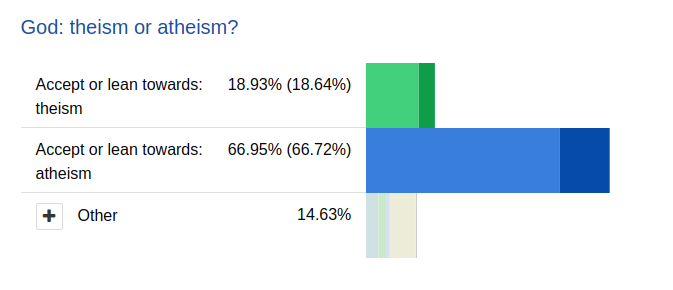"God" meaning something akin to the god in Abrahamic religions.
Resolves to expert consensus at market close.
Engaging in respectful dialogue allows for the exploration of different viewpoints and the sharing of personal experiences and perspectives. While it's valid to question and critically examine arguments, it's also essential to maintain a respectful and open-minded approach when discussing matters of belief. Such discussions can foster mutual understanding and intellectual growth, even if agreement is not reached on all points.
🏅 Top traders
| # | Name | Total profit |
|---|---|---|
| 1 | Ṁ17,157 | |
| 2 | Ṁ2,680 | |
| 3 | Ṁ532 | |
| 4 | Ṁ187 | |
| 5 | Ṁ46 |
This has been a great market, thanks to everyone that participated. This has been quite helpful in many ways and has helped me broaden my understand of philosophy and the concept of God.
From a poll of highly educated philosophers (Source can be found here: https://survey2020.philpeople.org) we have the following results:

So we can see the broader category of Theism gets 18.93%, however we would expect the category of Abrahamic type gods to be somewhat lower. Regardless, the weight of opinions points against God and towards a NO resolution.
https://www.youtube.com/watch?v=5eW6Eagr9XA this video has been quite helpful in thinking about what an "expert" is.
@levifinkelstein btw, I'm trying to get rid of some shares so I set up some limit orders in case anyone wants to sell their YES shares.
The challenge with this kind of question is that no matter what the answer is, someone will have to change their lives drastically. They'll very likely lose friends, beloved pastimes, and their sense of identity. That's a huge personal cost to pay, and when confronted with such a cost, the vast majority of people prefer to ignore or rationalize away evidence than pay it. It doesn't matter how smart a person is, or how compelling the evidence is, if they don't want the truth badly enough to suffer for it. Example: https://www.motherjones.com/politics/2013/09/new-study-politics-makes-you-innumerate/
With that in mind, evidence for the existence of God is extremely, hilariously abundant. I used to be an atheist. Now I wonder how I survived as one.
@MikeElias Hmmm, do you have some examples of the extremely, hilariously abundant knowledge? Asking because I legitimately want to see if I'm missing something important.
ah yea you’re gonna solve philosophy, religion, epistemology, and the entire domain of inquiry for that matter on Manifold Markets on the basis of “ ‘expert’ (whatever that means) opinion??” Jesus Christ you might as well have asked “does P = NP?” At least we might be able to and hopefully will solve that one in the coming century.
The only credible method of resolution for this is a rigorous and formal proof. Imagine being Aristotle and being asked, “can math describe everything?” Actually, the hard majority of mathematicians would answer you with a resounding “yes.” They can give you a well informed opinion, but it wouldn’t be for thousands of years until Gödel provided a formal proof that it couldn’t, blowing the establishment out of the water. The best case scenario is that the answer is knowable and answerable by currently well-developed systems of inquiry.
If you want, you be more honest by rephrasing the question to, “will qualified individuals on this matter reach consensus by d/m/y?” Even then, you’d still have to with mitigate the perverse incentives, outline resolution criteria, and figure out who might be a qualified person.
@GustavoMafra I am predicting that Levi will undergo divine revelation (God is the ultimate expert) and that this market will resolve >95%, with room for schizophrenia being the other <5%
Define God without using a religious reference
@eclair4151 "burden is on the people who believe in god to prove he does"
Always felt like that way of thinking is a mistake. The "burden of proof" concept is something you bring up to win debates, it's not something that teaches you anything about what is true or false.
If no evidence is brought up we don't just "assume" god doesn't exist, that would go against all sorts of rationalist principles. The correct choice is to just go with whatever prior we currently have.
@levifinkelstein It is not only useful for debates. It surely is the better epistemic principle to hold. You dont have to proof/provide evidence something does not exist which no evidence has been provided for. Else everyone would hold a burden of proof regarding to every claim/imagination. Which is as impossible to fulfill as it is absurd. So yes, we literally should assume god does not exist, as we already do with most other imaginations.
@EricMoyer I don't think most scientists would agree that God's existence is a scientific issue, it is not really a testable hypothesis
@GustavoMafra The God of the Abrahamic religions is one who interacted with the world a lot in the past (according to those religions). His creating the world and sending Moses, Jesus, Joseph Smith, Baháʼu'lláh, and/or Mohammed took place in time and are testable/falsifiable, at least in principle. This interaction is fundamental to who He is. You may have an unfalsifiable Deistic God, but an Abrahamic God must be active in history.


